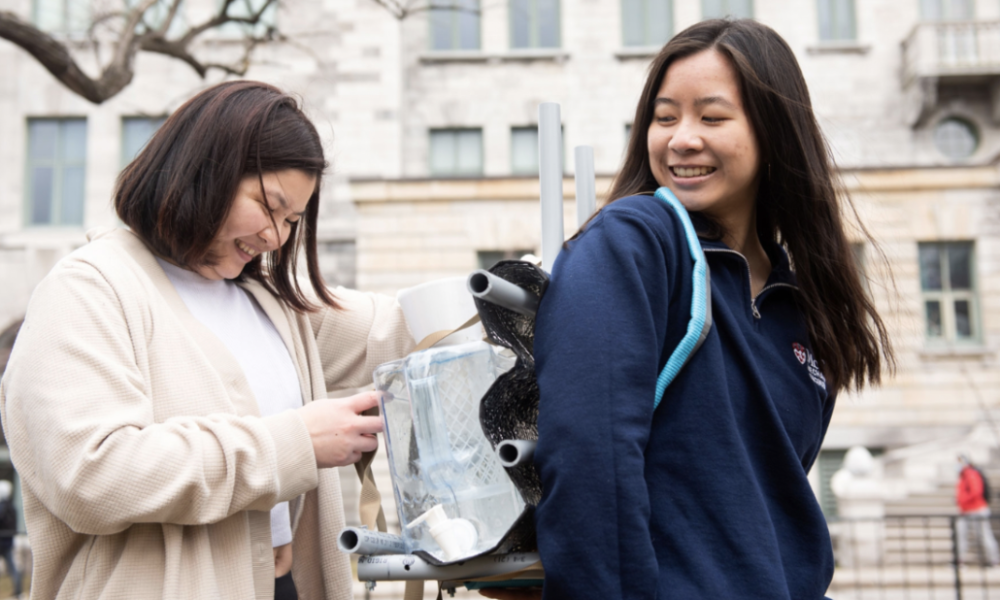Every day, more than 800 million people globally travel 30 minutes or more to access clean drinking water. Although access to clean water has improved since 2000, a lack of sanitation and sewage infrastructure, water treatment plants, and environmental factors like droughts mean that one in three people—especially those in rural areas—do not have a local clean water source. Their journeys are often gruelling and involve long walks in hot weather with water containers weighing up to 50 kilograms.
As part of McGill’s Impact200 program, Bernadette Ng and a team of six other McGill students in the Faculty of Engineering invented a product to alleviate some of the challenges associated with accessing clean water. The result of the team’s efforts, SOLar-A, is a backpack that promises to make the water collection journey less arduous: It is designed to comfortably carry 10 litres of water while simultaneously filtering toxins from the load.
SOLar-A uses a two-part filtration system to purify water of any physical or chemical contaminants. After passing through a physical filter that removes debris, the water undergoes solar disinfection (SODIS), a decontamination process that relies on sunlight to kill pathogens. The pack is also equipped with an ultraviolet measurement tool that uses the energy generated by the user’s footsteps to detect when the water has received sufficient sunlight exposure to eradicate toxins—or when it’s drinkable.
“In many communities, people have to walk long distances to have access to water and need to go through a few hours to clean the water,” Ng wrote in an email to The McGill Tribune. “With SOLar-A, they can start cleaning the water from the source, and save time in the disinfection process.”
In May 2022, SOLar-A underwent its first field test in the region of La Jagua at Alauca in Honduras. Ng and her team consulted with local communities after the test to collect feedback on the design’s comfort and to study its effectiveness in eradicating common pathogens such as E. coli. They found that SOLar-A was convenient and efficient, but the SODIS sterilization component isn’t yet able to reduce E. coli levels within a reasonable time frame. Ng and her team plan to refine these features of SOLar-A into an improved prototype.
According to Ng, the journey to create SOLar-A was a long one. She first became interested in equitable water access in high school, where she learned about Me to We, a charity targeting global poverty. While in CEGEP, Ng joined Global Brigades, a non-profit with chapters on many college campuses that provides hands-on experience to students interested in tackling global health challenges.
When she arrived at McGill, Ng was intent on continuing her efforts toward increasing water access and partnered with fellow engineering students to brainstorm solutions that they could reasonably achieve at the undergraduate level.
Ng’s training as an engineer, coupled with her humanitarian background, gave her a unique perspective on the role of technology and engineering in social problems.
“At school, we are given tools on how to solve problems and find solutions. But, often, we are not taught how to truly understand the problem at hand,” Ng wrote. “I believe that before […] trying to solve a humanitarian problem, it is first most important to create personal connections with the communities.”
Ng believes that more undergraduate students can put their ideas into action while still in school—having all the answers is less important than a willingness to learn. In fact, most faculties have clubs that offer hands-on learning opportunities, such as McGill BioDesign.
“Failing and trying is part of the process of learning from your mistakes and that is something that students should keep in mind when being afraid to take initiative and be a leader,” Ng wrote.








